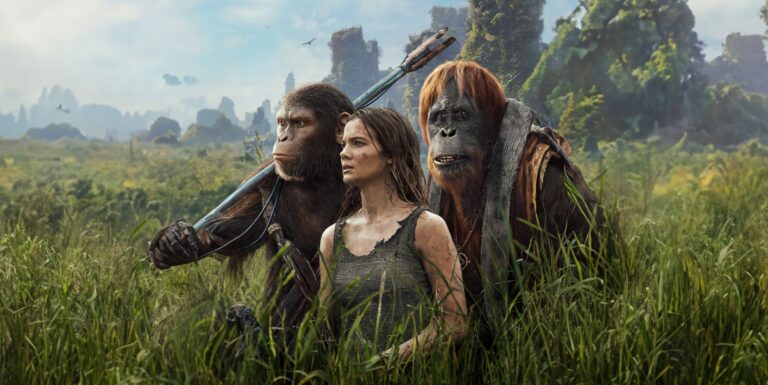The rebooted Planet of the Apes series — particularly the latter two films directed by Matt Reeves — is one of my favorite film trilogies of all time, right up there with Back to the Future and the Ocean’s movies, so I was more than a bit skeptical at the notion of additional films set in this universe. Not surprised, of course, as increasingly shaky box office numbers have studio executives scrambling for every recognizable IP under the sun in hopes of creating the sort of “event” film that begs to be seen in a theater, rather than waiting a few weeks for a streaming release. While the previous Apes flicks certainly fit that bill, I was concerned that Kingdom of the Planet of the Apes would be little more than a cash grab that would ultimately tarnish the reputation of its predecessors.
As it stands, however, those fears were largely unfounded. Set several hundred years after the life of Caesar, whose legacy nevertheless looms large over the events depicted here, Kingdom depicts a world reclaimed by nature, where towering skyscrapers have long since disappeared under vegetation and the few remaining humans are dimwitted creatures that travel in herds and flee like deer at the first sign of danger. Scattered across the globe and split into disparate clans each with their own customs and belief systems, most of the apes — including Noa (Owen Teague) and the other members of the Eagle Clan — have no idea how different their world had been just a few centuries ago, or how apes came to be the dominant species.
Domination is the keyword here, as a despotic ruler named Proximus (Kevin Durand) searches high and low for a mysterious girl named Mae (The Witcher‘s Freya Allen). Followers of Proximus commit horrific acts of violence: murdering humans, enslaving other apes and torching Noa’s village, for starters, and all in the name of Caesar — proving that humans aren’t the only species capable of corrupting ideals and rewriting history to support their pursuit of power. As one of the last remaining humans who retained her intellect and ability to speak, Proximus believes Mae holds the secret to a vast trove of human weapons and technology, a treasure that even his vast army of slaves has been unable to secure.
The Maze Runner director Wes Ball eschews the muted colors and dreary atmosphere of the Reeves films for a lush, colorful palette that accentuates the wilderness that has largely overtaken the remnants of human civilization. Likewise, cinematographer Gyula Pados serves up a veritable feast of stunning imagery, especially during Kingdom‘s action sequences. But as with the previous entries, its the apes themselves that continue to evoke such wonder; the motion capture technology that first brought Caesar to life in 2011 has continued to advance, and there’s a breathtaking amount of life and emotion in these digital creations. That’s not to say the human performers behind the computer generated wizardry don’t deserve their share of accolades, of course. To that end, the cast is uniformly solid, with Durand practically running away with the film during its latter half — his boisterous introduction gave me some major “can you dig it” vibes, and he balances that energy with a sinister, threatening undercurrent.
Kingdom of the Planet of the Apes may not reach the operatic highs of its forebearers, but it’s a satisfying addition that continues the franchise’s history of offering genuine thrills while also asking weighty, complicated questions that may not always have the sort of answers we’d like. And of course, a number of plot threads are left dangling, so if audiences flock to the box office, we can expect to see more of Noa and Mae in the years to come. As long as those future adventures are cut from the same cloth, there’s no reason we shouldn’t look forward to visiting this Planet again soon.

